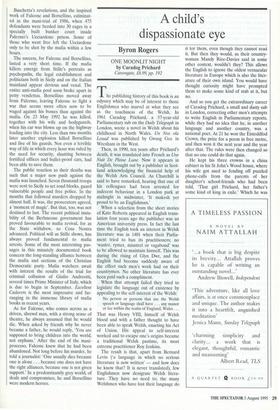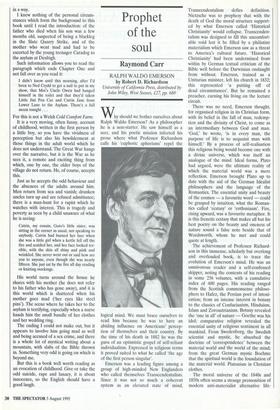A child's dispassionate eye
Byron Rogers
ONE MOONLIT NIGHT by Caradog Prichard Canongate, 18.99, pp. 192 The publishing history of this book is an odyssey which may be of interest to those Englishmen who marvel at what they see as the touchiness of the Welsh. In 1961 Caradog Prichard, a 57-year-old Parliamentary sub on the Daily Telegraph in London, wrote a novel in Welsh about his childhood in North Wales. Un Nos ola Leuad was published by Gwasg Gee in Wrexham in the West.
Then, in 1990, ten years after Prichard's death, it was translated into French as Une Nuit De Pleine Lune. Now it appears in English, brought out by a publisher in Scot- land acknowledging the financial help of the Welsh Arts Council. As Churchill is said to have remarked, hearing that one of his colleagues had been arrested for indecent behaviour in a London park at midnight in midwinter, 'It makesh yer proud to be an Englishman.'
When a selection from the short stories of Kate Roberts appeared in English trans- lation four years ago the publisher was an American university press. In fact the last time the English took an interest in Welsh literature was in 1401 when their Parlia- ment tried to ban its practitioners; no 'waster, rymer, minstrel or vagabond' was to be allowed to maintain himself. This was during the rising of Glyn Dwr, and the English had become suddenly aware of the effect such men's work had on their countrymen. No other literature has ever been paid such a compliment.
When that attempt failed they tried to legislate the language out of existence by appealing to the self-interest of the Welsh:
No person or persons that use the Welsh speech or language shall have. . . any manor or fee within the realm of England, Wales .. . That was Henry VIII, himself of Welsh blood and with a father thought to have been able to speak Welsh, enacting his Act of Union. His appeal to self-interest worked and to escape one's origins became a traditional Welsh pastime, its most extreme practitioner Roy Jenkins.
The result is that, apart from Bernard Levin Ca language in which no serious literature is now written' — and how does he know that? It is never translated), few Englishmen now denigrate Welsh litera- ture. They have no need to; the many Welshmen who have lost their language do it for them, even though they cannot read it. But then they would, as their country- woman Mandy Rice-Davies said in some other context, wouldn't they? This allows the English to ignore the oldest vernacular literature in Europe which is also the liter- ature of their own island. You would have thought curiosity might have prompted them to make some kind of stab at it, but no.
And so you get the extraordinary career of Caradog Prichard, a small and dusty sub in London, correcting other men's attempts to write English in Parliamentary reports, while they had no idea that he, in another language and another country, was a national poet. At 21 he won the Eisteddfod Crown, the prize for a poem in free metre, and then won it the next year and the year after that. The rules were then changed so that no one could do that again.
He kept his three crowns in a china cabinet in his St John's Wood house, where his wife got used to fending off puzzled phone-calls from the parents of her daughter's school-friends who had been told, 'That girl Prichard, her father's some kind of king in exile.' Which he was in a way.
I knew nothing of the personal circum- stances which form the background to this book until I read the introduction: of the father who died when his son was a few months old, suspected of being a blackleg in the Slate Quarry Strike, and of the mother who went mad and had to be escorted by the young teenager Caradog to the asylum at Denbigh.
Such information allows you to read the paragraph which ends Chapter One and not fall over as you read it:
I didn't know until this morning, after I'd been to Ned Crydd to get a nail to put in my show, that Moi's Uncle Owen had hanged himself in the toilet and that they'd taken Little Jini Pen Cae and Catrin Jane from Lower Lane to the Asylum. There's a full moon tonight . . .
For this is not a Welsh Cold Comfort Farm.
It is a very moving, often funny, account of childhood, written in the first person by a little boy, so you have the vividness of perception but also his bewilderment at those things in the adult world which he does not understand. The Great War hangs over the narrative, but it is the War as he sees it, a remote and exciting thing from which, one by one, the older boys of the village do not return. He, of course, accepts this.
Just as he accepts the odd behaviour and the absences of the adults around him. Men return from sea and vanish; drunken uncles turn up and are refused admittance; there is a man-hunt for a rapist which he watches with interest. This is tragedy and poverty as seen by a child unaware of what he is seeing: Catrin, my cousin, Guto's little sister, was sitting in the corner as usual, not speaking to anybody. Catrin had burned her face when she was a little girl when a kettle fell off the fire and scalded her, and her face looked ter- rible, with the skin all shiny and pink and wrinkled. She never went out or said how are you to anyone, even though she was nearly fifteen. She just sat by the fire all day reading or knitting stockings.
His world turns around the house he shares with his mother (he does not refer to his father who has gone away), and it is this world which is shattered when his mother goes mad Cher eyes like steel pins'). The scene where he takes her to the asylum is terrifying, especially when a nurse hands him the small bundle of her clothes and her wedding ring.
The ending I could not make out, but it appears to involve him going mad as well and being accused of a sex crime, and there is a whole lot of mystical writing about a mountain, with slabs of the Bible thrown in. Something very odd is going on which is beyond me.
But this is a book well worth reading as an evocation of childhood. Give or take the odd suicide, rape and lunacy, it is about innocence, so the English should have a good laugh.



















































 Previous page
Previous page